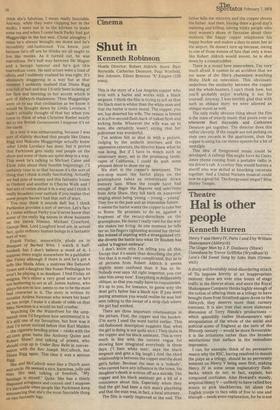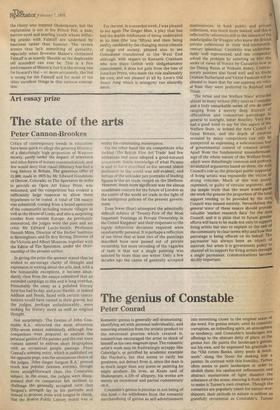Theatre
Hal is other people
Kenneth Hurren
Henry V and Henry IV, Parts I and 2" by William Shakespeare (Aldwych)
The Ginger Man by J. P. Donleavy (Shaw) Comedians by Trevor Griffiths (Wyndham's) Love's Old Sweet Song by John Hale (Greenwich) A sharp and feverishly mind-disordering attack of 'flu imposes brevity at an inappropriate moment: there are over nine hours of stage traffic in the Henrys alone, and since the Royal Shakespeare Company thinks highly enough of the notion of offering them as a trilogy to have brought them from Stratford-upon-Avon to the Aldwych, they deserve more than cursory comment. It is also true that more elaborate discussion of Terry Hands's productions — which splendidly realise Shakespeare's epic encapsulation of the whole of the social and political scene of England at the turn of the fifteenth century — would be more favourable: it is the irritations rather than the broader satisfactions that surface in the immediate impression.
I can, for example, think of no persuasive reason why the RSC, having resolved to mount the plays as a trilogy, should be so perversely insistent on Henry V being seen first, making Henry IV in some sense explanatory flashbacks; which do not, in fact, explain, but compound confusion. Alan Howard's moody, sceptical Henry V — unlikely to have rallied boy scouts to pick blackberries, let alone the English troops to face odds of five to one and triumph — needs some explanation, for he is not the Henry who inspired Shakespeare; but the explanation is not in his Prince Hal, a pale, narrow-eyed and snarling youth whose deflating pranks with Falstaff are underlaid by nastiness rather than humour. The tavern scenes thus lack something of geniality, especially when Brewster Mason's victimised Falstaff is as sunnily likeable as the deplorable old scoundrel can ever be. This is a fine performance of Mason's, but it is the wrong one for Howard's Hal — or, more accurately, the Hal is wrong for the Falstaff and for most of the other excellent things in this curious conception. For the rest, in a crowded week, I was pleased to see again The Ginger Man, a play that has had the double misfortune of being underrated in its time (the late 'fifties) and then being swiftly outdated by the changing moral climate of stage and society; pleased also to see Comedians transferred to the West End although, with respect to Kenneth Cranham who now plays Gethin with sledgehammer commitment, it does not gain from the loss of Jonathan Pryce, who made the role inalienably his own; and not pleased at all by Love's Old Sweet Song which is misogyny run absurdly amok.



























 Previous page
Previous page